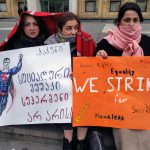
Social workers in Georgia are being forced to pay for taxi services from their own pocket in order to visit beneficiaries, including victims of domestic abuse.
On 13 April, the Union of Social Workers released a joint statement with the Human Rights Education and Monitoring Centre, a local rights group, calling on the Health Ministry to resolve the issue and provide social workers with transportation.
‘The efficient work of social workers might have a crucial role in saving people facing aggravated social and economic situations during the period of the crisis’, said the statement.
Job-related travel expenses have been a long-running issue for the country’s social workers, however, the problem has become more acute after the government shut down public transport in March due to the COVID-19 pandemic.
Ketevan Khutsishvili, a social worker at the Health Ministry told OC Media that she and her colleagues did not want to raise the issue during the pandemic given the critical situation in the country, but decided to speak up because officials were turning the blind eye to the problem.
After a state of emergency was declared in March, social workers began working mostly from home, however, they say they must still visit beneficiaries in emergencies.
‘Now it comes down to the goodwill of social workers. This was true before as well. Some of us visited beneficiaries with borrowed money. Sometimes it costs us ₾25 ($7.90) a day to travel. This is especially true for social workers living in the regions’, said Khutsishvili.
‘When you have to pay this much from your pocket to do your job, it’s easy to guess how soon this resource will expire.’
Khutsishvili said that while some beneficiaries can be monitored with a phone call, there are others who cannot be helped via phone.
‘You cannot work on every issue from a distance. For example, when it comes to violence against children or domestic abuse. We receive calls even during the curfew hours as well. Some of us have passes and can go outside during curfew. Violence may happen anytime’, said Khutsishvili.
A long-standing issue
Georgian social workers have been protesting the issue of transportation expenses for some time now. In March 2019, almost all of the country’s social workers went on strike to protest what they said were systemic problems in the Social Services Agency.
Their main demands were that the number of social workers and lawyers employed by the agency, which operates under the Health Ministry, be increased and that a maximum number of cases assigned to each social worker be set.
They also demanded higher wages or a separate budget to cover their work travel expenses. Other demands included personal computers for employees, a professional development scheme for social workers, and an exemption from work that is not a part of their professional obligations.
They returned to work after a week-long strike announcing that the government had ‘partially’ met their demands.
Ketevan Khutsishvili told OC Media that after the strike, they were temporarily provided with vehicles. She said this changed in March following a reorganisation of the ministry.
After the reorganisation, the Social Service Agency was transferred under the State Fund for Protection and Assistance of (Statutory) Victims of Human Trafficking, also a Health Ministry body.
Khutsishvili said that officials then told them they could no longer use the agency’s cars.
‘We raised this issue with the Health Minister, however, our communication is one-sided. We write to them, but they don’t write back’, said Khutsishvili.
‘Currently, there are only 200 social workers covering the whole country. During the reorganisation, they fired 33 social workers and announced 33 vacancies. However, we still don’t know the results of competition’, said Khutsishvili.
The Health Ministry declined to comment on the issue.











